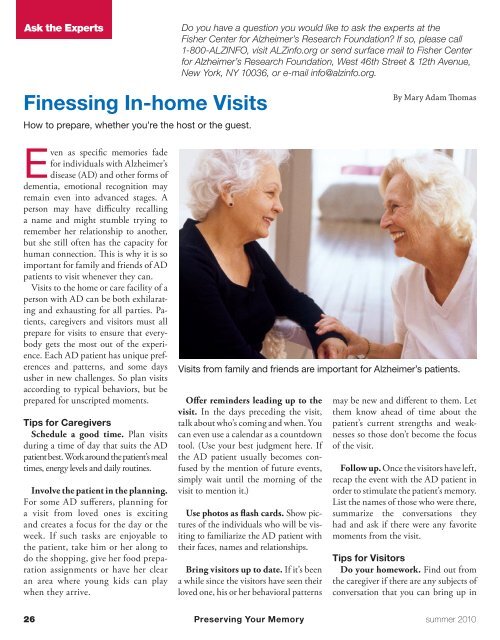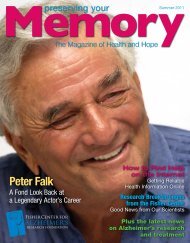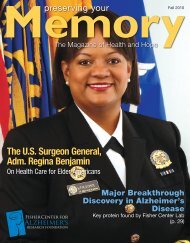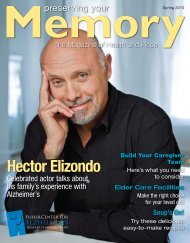Tracie Thoms - Fisher Center for Alzheimer's Research Foundation
Tracie Thoms - Fisher Center for Alzheimer's Research Foundation
Tracie Thoms - Fisher Center for Alzheimer's Research Foundation
You also want an ePaper? Increase the reach of your titles
YUMPU automatically turns print PDFs into web optimized ePapers that Google loves.
Ask the Experts<br />
Do you have a question you would like to ask the experts at the<br />
<strong>Fisher</strong> <strong>Center</strong> <strong>for</strong> Alzheimer’s <strong>Research</strong> <strong>Foundation</strong>? If so, please call<br />
1-800-ALZINFO, visit ALZinfo.org or send surface mail to <strong>Fisher</strong> <strong>Center</strong><br />
<strong>for</strong> Alzheimer’s <strong>Research</strong> <strong>Foundation</strong>, West 46th Street & 12th Avenue,<br />
New York, NY 10036, or e-mail info@alzinfo.org.<br />
Finessing In-home Visits<br />
How to prepare, whether you’re the host or the guest.<br />
By Mary Adam Thomas<br />
Even as specific memories fade<br />
<strong>for</strong> individuals with Alzheimer’s<br />
disease (AD) and other <strong>for</strong>ms of<br />
dementia, emotional recognition may<br />
remain even into advanced stages. A<br />
person may have difficulty recalling<br />
a name and might stumble trying to<br />
remember her relationship to another,<br />
but she still often has the capacity <strong>for</strong><br />
human connection. This is why it is so<br />
important <strong>for</strong> family and friends of AD<br />
patients to visit whenever they can.<br />
Visits to the home or care facility of a<br />
person with AD can be both exhilarating<br />
and exhausting <strong>for</strong> all parties. Patients,<br />
caregivers and visitors must all<br />
prepare <strong>for</strong> visits to ensure that everybody<br />
gets the most out of the experience.<br />
Each AD patient has unique preferences<br />
and patterns, and some days<br />
usher in new challenges. So plan visits<br />
according to typical behaviors, but be<br />
prepared <strong>for</strong> unscripted moments.<br />
Tips <strong>for</strong> Caregivers<br />
Schedule a good time. Plan visits<br />
during a time of day that suits the AD<br />
patient best. Work around the patient’s meal<br />
times, energy levels and daily routines.<br />
Involve the patient in the planning.<br />
For some AD sufferers, planning <strong>for</strong><br />
a visit from loved ones is exciting<br />
and creates a focus <strong>for</strong> the day or the<br />
week. If such tasks are enjoyable to<br />
the patient, take him or her along to<br />
do the shopping, give her food preparation<br />
assignments or have her clear<br />
an area where young kids can play<br />
when they arrive.<br />
Visits from family and friends are important <strong>for</strong> Alzheimer’s patients.<br />
Offer reminders leading up to the<br />
visit. In the days preceding the visit,<br />
talk about who’s coming and when. You<br />
can even use a calendar as a countdown<br />
tool. (Use your best judgment here. If<br />
the AD patient usually becomes confused<br />
by the mention of future events,<br />
simply wait until the morning of the<br />
visit to mention it.)<br />
Use photos as flash cards. Show pictures<br />
of the individuals who will be visiting<br />
to familiarize the AD patient with<br />
their faces, names and relationships.<br />
Bring visitors up to date. If it’s been<br />
a while since the visitors have seen their<br />
loved one, his or her behavioral patterns<br />
may be new and different to them. Let<br />
them know ahead of time about the<br />
patient’s current strengths and weaknesses<br />
so those don’t become the focus<br />
of the visit.<br />
Follow up. Once the visitors have left,<br />
recap the event with the AD patient in<br />
order to stimulate the patient’s memory.<br />
List the names of those who were there,<br />
summarize the conversations they<br />
had and ask if there were any favorite<br />
moments from the visit.<br />
Tips <strong>for</strong> Visitors<br />
Do your homework. Find out from<br />
the caregiver if there are any subjects of<br />
conversation that you can bring up in<br />
26 Preserving Your Memory summer 2010






